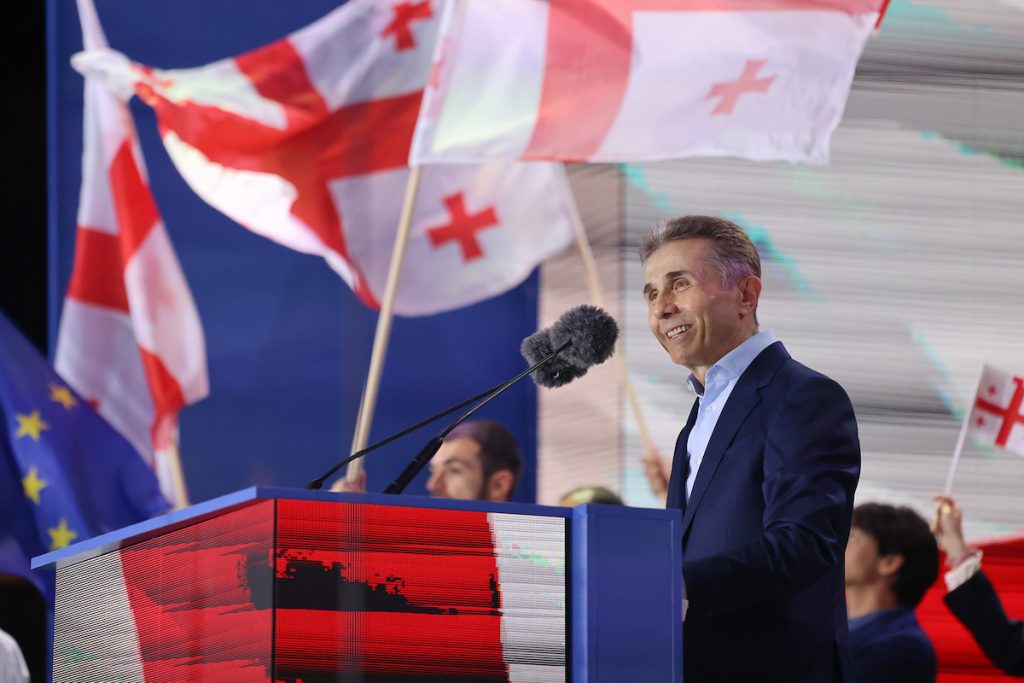Ivanishvili voiced what awaits Georgia after the elections at the rally (spoiler: nothing good)
Ivanishvili at the rally in Tbilisi

On April 29, the “Georgian Dream” held a massive rally near the parliament in Tbilisi in response to the large-scale protests against the “foreign agents” law. The aim of the rally was to demonstrate that the government also has its supporters.
The rally saw the participation of people employed in the public sector, with many of them brought in from the regions via minibuses and taxis.
The speech by Bidzina Ivanishvili, the honorary chairman of the ruling party “Georgian Dream,” became the most important and climactic moment of the rally. In fact, Ivanishvili is the de facto ruler of the country, which was once again confirmed on April 29.
Speech delivered by Ivanishvili at the rally was evaluated by many political analysts as a programmatic plan for what the government intends to do in October in the event of victory in the parliamentary elections.
We’ve discussed the experts’ assessments separately.
Here’s what Ivanishvili said during his speech:
- Ivanishvili immediately pointed out who he considers the enemies of his government: the West, the opposition, and the non-governmental sector.
- The majority of the speech was dedicated to demonizing the West. Ivanishvili constantly referred to Georgia’s Western partners as “foreign agents” and “part of a global war party.”
- Ivanishvili stated that today Georgia is battling with the “global war party,” for which “Georgia and Ukraine are only valuable as cannon fodder.”
- Russia was mentioned only once in Ivanishvili’s speech — in the context of the fact that in 2008, the “global war party” set Georgia against Russia and then against Ukraine. This is how Ivanishvili sees the ongoing war in Ukraine.
- Ivanishvili mentioned the word “sovereignty” 10 times, stating that the “global war party,” with the help of NGOs, wants to take away Georgia’s sovereignty. He also mentioned that over the years, the government has accumulated enough resources to begin “comprehensive strengthening of sovereignty,” and that is exactly what the “Law on Transparency of Foreign Influence” serves.
- Ivanishvili acknowledged that the reintroduction of the “foreign agents” bill is his personal initiative and as an experienced political leader, he “made the right move at the right time” and chose the perfect moment to bring back the law.
- Ivanishvili admitted that the “foreign agents” bill is being passed to silence the non-governmental sector.
- Ivanishvili announced that after the elections, he is ready for repression against political opponents, particularly the “National Movement.”
- Ivanishvili essentially stated that the government does not intend to take into account European recommendations regarding the reform of the judicial system in the country.
External forces and the struggle for sovereignty
In his speech, Ivanishvili stated that Georgia once had a foreign government in the form of Saakashvili’s “National Movement.” According to him, the “rose revolution” was organized by external forces through NGOs, and now they want to repeat the same.
“Today, these foreigners are driven by the desire to bring back the dictatorship of the same anti-human and sadistic people to Georgia, which we will not allow at any cost,” Ivanishvili said.

Ivanishvili traditionally spoke extensively about Saakashvili and his government.
According to Ivanishvili, the country was liberated from Saakashvili’s regime in 2012, but that was not the end of it, and today “Georgian Dream” still has to fight for “freedom and sovereignty threatened by foreign forces.”
“Today’s Georgia is not Shevardnadze’s Georgia or Yanukovych’s Ukraine. Today, Georgia is governed by a strong and united team of professionals who understand the value of the Homeland, independence, and sovereignty. Therefore, it is impossible to change the government in today’s Georgia by the hands of non-rating “nationalists” and NGOs. However, this does not mean that we should lose vigilance and not take care of creating long-term guarantees of Georgia’s sovereignty. The Law on Transparency of Foreign Influence serves to strengthen Georgia’s sovereignty.
“An elite without a Homeland, in the words of Jawaharlal Nehru”
Speaking about the non-governmental sector, Ivanishvili stated that “there is no greater enemy to one’s own country than the pseudo-elite raised by a foreign country.” According to Ivanishvili, these words are an adaptation of a quote by Jawaharlal Nehru. [JAMnews could not find this quote by Nehru online. It can only be found in Russian sources.]
According to Ivanishvili, the funding of NGOs, “which are often thanked and considered to be helping us from abroad, is actually used almost entirely to strengthen agents and bring them to power.”
“Therefore, these organizations have nothing to do with assistance; on the contrary, their sole purpose is to take away Georgia’s state sovereignty,” said the former prime minister.
Attempt to drag Georgia into war
According to Ivanishvili, since the beginning of 2022 and to this day, “Georgia has experienced a fierce struggle to prevent war and maintain peace.” And despite the enormous efforts of the “global war party,” they failed to turn Georgia into a second front.
Ivanishvili explains in detail why the decision was made to reintroduce the “foreign agents” law for consideration
According to Ivanishvili, if last year the government’s opponents were able to “mislead the majority of society” and jeopardize the “political stability of the country,” then this year the situation has changed.
In Ivanishvili’s opinion, “the majority of society now firmly supports NGO transparency.”
Ivanishvili traditionally praised his own political foresight and indirectly admitted that he was the initiator of bringing back the bill to parliament. This is further confirmation that Ivanishvili is an informal ruler of Georgia.
“To make the right move at the right time is the main art of politics. My political past allows me to prove that as a political leader, I am good at calculating such steps.”
Referring to the reintroduction of the “foreign agents” law, Ivanishvili cited another tactical reason:
“They have run out of steam ahead of time, and as usual, the momentum of protests diminishes over time,” he continued, once again praising his own decision:
“Accordingly, the timing for initiating bills is ideal.” From this text, it is clear that the government is concerned about the October elections and expects significant public protests.
According to Ivanishvili, “non-transparent” financing of NGOs does more harm to the country than the adoption of the “agents” bill.
“Non-transparent financing of NGOs is the main tool through which the government of Georgia can be appointed from outside,” Ivanishvili said.
Ivanishvili did not specify whether he expects specific sanctions from the West but stated that, “except for dissatisfaction from the ‘global war party,’ the adoption of this bill does not threaten the government with anything.”
Courts and CEC
In his speech, Ivanishvili essentially admitted that the “foreign agents” law was passed specifically to restrict the activities of the non-governmental sector.
“Let no one have illusions that they would leave us alone for long… I remind you how all this time they tried to shake up the Central Election Commission and the courts.”
Ivanishvili emphasized that the government of the “Georgian Dream” would not allow the changes in the judicial system demanded by Georgia’s Western partners and the non-governmental sector.
In December, the European Union granted Georgia candidate status. However, Brussels stated that before officially starting membership negotiations, Tbilisi would have to reform its judicial and electoral systems, reduce political polarization, improve press freedom, and limit the power of oligarchs.
“The judiciary still demands the so-called verification [procedure for verifying the integrity of judges], that is, the introduction of a foreign government that should carry out repression and staff the judicial system. Similar goals were pursued by the demands related to the Central Election Commission, which the Georgian Parliament rightly did not consider.”
In his speech, Ivanishvili gave high praise to the judicial system. According to him, in international rankings, the Georgian judiciary “even surpasses the courts of many EU member states in fairness and efficiency,” and it is “free from political pressure.”
On April 5, 2023, the US State Department imposed sanctions against four Georgian judges. The reasons cited were corruption and abuse of power. The government`s opponents say that these judges created a judicial clan following the directives of the “Georgian Dream.” This was the first instance when the US applied sanctions, and they targeted the judiciary. International reports increasingly highlight problems in the Georgian judiciary. The judicial system in Georgia serves as an instrument of political influence and obstructs the country’s aspirations toward the Euro-Atlantic space.
Ivanishvili sees Western partners’ attempts to reform the judicial system as follows:
“There continues to be constant pressure in power to take control of the courts.”
Opposition
Ivanishvili stated that after the elections in the country, important changes would begin directed against the largest opposition party in the country:
“Many of our compatriots are upset that we did not punish the nationalists properly in 2012. Several leaders of the regime served long sentences… Currently, the chief criminal of the regime, Mikheil Saakashvili, is serving his punishment. However, there have been no trials against the ‘National Movement’ as a single criminal and treasonous group… After the elections, we will have the opportunity to pass a harsh politico-legal verdict on the collective ‘National Movement.'”
According to Ivanishvili, after the elections, “full consolidation of sovereignty” will begin:
“People who directly dealt with this issue will agree with me that we had no resources at that time to punish the ‘nationalists,’ and taking steps without resources would have been counterproductive… Over the years, we have accumulated sufficient resources to begin the complete strengthening of our sovereignty. This is what the Law on Transparency of Foreign Influence serves,” Ivanishvili said.
According to him, “after the elections, the ‘National Movement’ will be held strictly accountable for all the crimes they committed against the Georgian state and the Georgian people over two decades!” [“National Movement” was in power for nine years. “Two decades” apparently refers to the years of the party’s existence in general — JAMnews]
Conclusion. Joining the European Union
In conclusion, Ivanishvili stated that by 2030, Georgia would become a member of the European Union
“I promise you that we will overcome all obstacles, strengthen our sovereignty, maintain peace, strengthen Georgia’s economy, and become a member of the European Union by 2030.”
However, Georgia intends to join the European Union only with its “unique history, traditions, and identity,” “because only in this case can the European Union have real value for Georgia, and Georgia — for the European Union.”



















